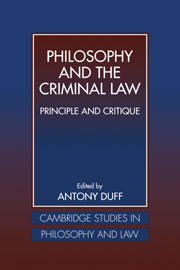Book contents
- Frontmatter
- Contents
- List of Contributors
- Introduction
- 1 Contingency, Coherence, and Conceptualism: Reflections on the Encounter between ‘Critique’ and ‘the Philosophy of the Criminal Law’
- 2 Does Criminal Liability Require an Act?
- 3 ‘Simulacra of Morality’? Beyond the Ideal/Actual Antinomies of Criminal Justice
- 4 Principle and Contradiction in the Criminal Law: Motives and Criminal Liability
- 5 On the General Part of the Criminal Law
- Index
5 - On the General Part of the Criminal Law
Published online by Cambridge University Press: 17 September 2009
- Frontmatter
- Contents
- List of Contributors
- Introduction
- 1 Contingency, Coherence, and Conceptualism: Reflections on the Encounter between ‘Critique’ and ‘the Philosophy of the Criminal Law’
- 2 Does Criminal Liability Require an Act?
- 3 ‘Simulacra of Morality’? Beyond the Ideal/Actual Antinomies of Criminal Justice
- 4 Principle and Contradiction in the Criminal Law: Motives and Criminal Liability
- 5 On the General Part of the Criminal Law
- Index
Summary
The Idea of the General Part
It was, I think, Glanville Williams who first envisaged the formal division of English criminal law into a ‘special part’ and a ‘general part’. He explicitly borrowed the distinction from continental legal systems, many of which carry it on the face of their criminal codes. Although Williams did not state it consistently, it seems that the distinction is supposed to be drawn along the following lines: The special part supplies the details of particular criminal offences and arranges them into families. The general part, meanwhile, is made up of doctrines that cross the boundaries between (some or all of) these different families of criminal offences. One source of problems in the application of this distinction is readily apparent. It comes of the idea of a ‘family’ of offences. You may well ask: When does the application of a certain doctrine across a number of offences turn those offences into a ‘family’, such that the doctrine in question belongs to the special part rather than to the general part? And don't some ‘families’ of offences (such as ‘sexual offences’, ‘offences of specific intent’, and ‘inchoate offences’) overlap, so that some doctrines unavoidably spill over from one family to another and mutate in the process from special-part doctrines into general-part doctrines? These are certainly challenging questions. I hope that the argument which follows will help us to make progress towards some answers.
- Type
- Chapter
- Information
- Philosophy and the Criminal LawPrinciple and Critique, pp. 205 - 256Publisher: Cambridge University PressPrint publication year: 1998
- 3
- Cited by



